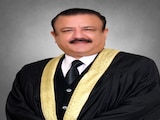- Germany's next chancellor, Friedrich Merz, faces multiple challenges.
- He aims to manage tense relations with the US under President Trump.
- Support for Ukraine's military efforts will remain a top priority.
From managing ties with a mercurial US president to bolstering support for Ukraine and fixing Europe's beleaguered top economy, Germany's designated next chancellor Friedrich Merz will have an overflowing in-tray.
Here are five key tasks for the new coalition as Merz prepares to be sworn in Tuesday:
Navigating tricky US ties
Germany is traditionally a staunch ally of the United States, and Merz himself -- once an executive at US asset manager BlackRock -- has long been a committed transatlanticist.
But, like many of Washington's traditionally close partners, the incoming chancellor has been rattled by signs that US President Donald Trump's administration seems determined to upend long-standing security and trade ties with Europe.
"We have come to realise that we can no longer be sure of the transatlantic relationship in the spirit of freedom and the rules-based order," Merz said recently.
Still, the conservative leader has also said that he hopes to "convince the Americans" to maintain good relations.
As someone with considerable experience in the world of business, he may figure he has a good chance of building a rapport with Trump.
Supporting Ukraine
Germany has been a key supporter of Ukraine since Russia's full-scale invasion in 2022, dropping a traditionally pacifist stance to become Kyiv's biggest military backer after the United States.
That backing looks set to continue under the new government, with Merz saying last month that "there must be no doubt where we stand: namely, without any ifs or buts, on the side of this attacked country".
Both new foreign minister Johann Wadephul and Defence Minister Boris Pistorius -- who already served in the outgoing government -- have also voiced unequivocal support for Kyiv.
Billions of euros have already been earmarked for Germany to support Kyiv in the coming years, and Merz has said he is open to supplying Ukraine with long-range Taurus missiles -- a step outgoing Chancellor Olaf Scholz had ruled out.
Berlin, like other European powers, is also watching nervously as Trump seeks to push President Volodymyr Zelensky and Vladimir Putin into a quick agreement on ending the war.
Boosting the military
The Ukraine war and growing Russian threat had already spurred Germany into ploughing extra funds into its notoriously threadbare armed forces, but the task has taken on greater urgency as worries grow about US security guarantees for Europe.
In their coalition agreement, Merz's CDU/CSU bloc and their partners, the centre-left Social Democrats (SPD), said they wanted to "significantly" boost defence spending, with the exact sums tied to NATO's capability requirements.
The incoming government will have vast extra resources available after the parties succeeded in pushing changes to Germany's strict debt rules through parliament, paving the way for vastly higher defence spending in the coming years.
The government also wants to reintroduce military service, on an "initially voluntary basis" with the aim of "permanently increasing the willingness to serve", according to the agreement.
Fixing the economy
Germany's economy shrank for the past two years as it faced a perfect storm of a manufacturing slowdown, surging energy costs and weak demand in key export markets, in particular China.
The new government has vowed to jumpstart the economy with a mix of targeted investments, lower taxes and reduced red tape, but the task will be much harder as Trump's tariffs hit export demand from Germany's top trading partner.
Planned extra spending on defence as well as infrastructure -- the incoming government is setting up a 500-billion-euro ($570-billion) infrastructure fund to be disbursed over 12 years -- is expected to boost growth, although its effects could take some time to be felt.
But economists warn that more comprehensive, structural reforms are needed to help solve some of Germany's deep-rooted problems, such as skilled labour shortages and a lack of competitiveness.
Curbing irregular migration
The CDU/CSU bloc vowed on the campaign trail that curbing irregular immigration would be a top priority and the two parties have agreed on tough measures.
They have agreed to reject undocumented immigrants, including asylum seekers, at the border, and that fixed controls will remain in place.
Incoming interior minister Alexander Dobrindt told the Bild newspaper that the first measures would be introduced as soon as the government takes office.
"The illegal immigration numbers must come down," said the CSU politician.
(Except for the headline, this story has not been edited by NDTV staff and is published from a syndicated feed.)















